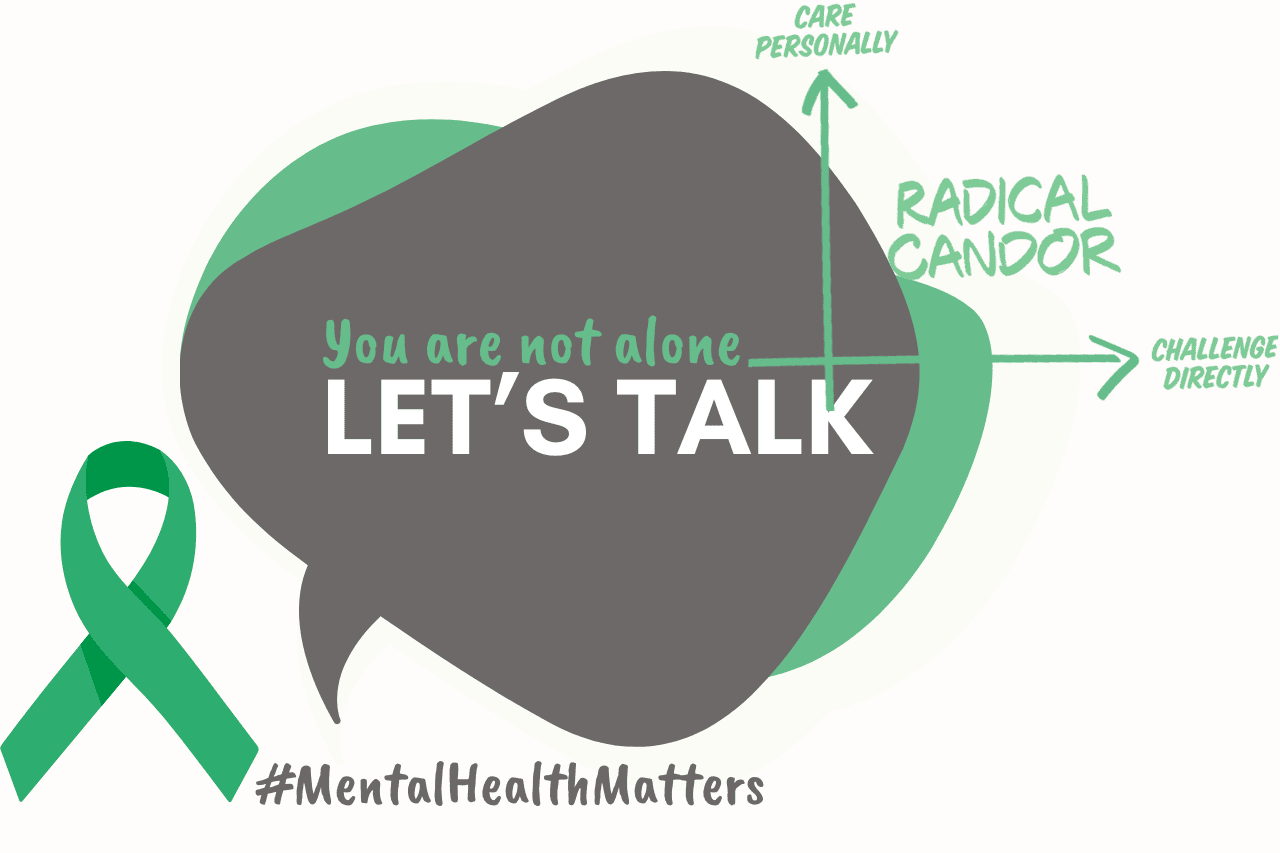7 Ways to Take Care of Your Mental Health at Work — Tips from the Radical Candor Team
If you're not already talking about mental health at work, it's time to start. Even though I have a wonderful job with amazing people who walk the...
5 min read
Radical Candor May 22, 2023 11:52:07 AM

*This post about Radical Candor and mental health discussions at work was contributed by Chris Harley, an expert in mental health with a background in clinical psychology.
It wasn’t until my bouts of anxiety became so overwhelming and caused the quality of my work to suffer significantly that I felt compelled to speak to my supervisor and explain my reluctance to take part in projects was due to my experiencing a mental health challenge.
Finally having that conversation with my boss was a huge relief. Opening up and being honest about my anxiety with my colleagues created a mutual understanding and I no longer had to suffer in silence.
According to the Center for Workplace Mental Health, “The World Health Organization recently reported that an estimated 12 billion working days will be lost to untreated depression and anxiety by the year 2030, resulting in a global cost of $925 billion.”
But, there is good news. “For every $1 invested in treating depression and anxiety, there is a $4 return for the economy. While scaling up treatment for depression and anxiety would cost $147 billion over the next 15 years, it would yield a 5% improvement in workforce participation — representing a $399 billion return on investment.”
This means that companies who invest in educating themselves and their employees about mental health and supporting mental health programs can retain their employees and create a supportive work environment.
While this makes sense for the health of employees and companies, many organizations have a long way to go. Research from the American Psychiatric Association noted that one in four workers don’t know where to guide their co-workers who are struggling with their mental health.
The poll also found that: “A significant portion of workers, more than one in three, are concerned about retaliation or being fired if they seek mental health care. Looking at age and gender, younger men are more likely to be concerned than older men or women of any age about retaliation.”
How can employers make it safe for their employees to talk about mental health at work?
In addition to being a proven framework for giving and receiving feedback, Radical Candor, Caring Personally while Challenging Directly, can help create an environment of psychological safety for productive discussions about mental health at work.
By encouraging employees to talk, and by being open to their views and experiences, leaders can develop more effective discussions around mental health in the workplace.
Most contemporary businesses would claim they encourage their employees to be themselves. It’s not only the best way to get people to think outside the box and unlock their true potential but being able to truly be authentic at work is critical for allowing people to feel comfortable displaying emotions.
In the workplace, there’s a sense that in order to remain professional, we need to suppress our emotions and keep quiet when we feel angry, upset or stressed. But too often, that mindset can result in people leaving their compassion at home and taking a cold approach in the office.
Research has proven that experiencing negative emotions like shame and distress at work can be detrimental to performance. What’s more, over time, this can have a damaging impact on mental well-being.

Making space for emotions in the workplace and challenging colleagues to be authentically themselves, whatever mood or emotion might arise day to day, is part of developing a culture of Radical Candor, fostering strong morale and promoting positive mental health conversations.
By overlooking emotions, businesses are ignoring a critical element of what makes their employees human beings, which is the opposite of embracing their humanity.
In order to encourage people to speak candidly about mental health at work, you need to create what author and Harvard Business School Professor Amy Edmondson calls this psychological safety — feeling heard and acknowledged versus fearing you will be retaliated against.
The best way to create psychological safety is to actively and continually solicit feedback from others, and reward the feedback when you get it.
For many business owners and employees alike, mental health can seem like a personal concern — one that is meant to be avoided at work. But work is where people spend most of their time and it also considerably impacts mental health. In keeping mental health talks out of the workplace, leaders are doing more harm than good.
When someone is experiencing emotions at work, how you react when someone is emotional is what matters far more than whether they’ve become emotional: Recognize they are not in a “teachable moment” if they are emotional or defensive. If you see this, you have some options.
You could start the conversation (in private) by saying something like, "It seems like you're struggling with something, how can I help?" You can also refer the employee to an employee assistance program if you have one or refer them to some external resources and work together on a path forward.
You can ask simple questions to move the person out of the limbic system/threat zone, such as “tell me how you are feeling right now,” or “how would you like to proceed?” These questions have the effect of helping someone move out of threat response and into problem-solving.
Be prepared to give the person a bottle of water and a 15-minute break (or even a break until the next day) to make sure you can have a discussion.
There is a solid chance the person will only have heard a fraction of what you said, so you will need to check to see that your feedback landed (gauge your feedback) to make sure you both are seeing this thing similarly.
Be sure to fully understand their perspective, too — this is really what giving guidance and feedback “humbly” means.
@radicalcandorofficial Toxic workplace environment? Never heard of that ♀️✨ Use Radical Candor to help you be the best boss without losing your humanity #RadicalCandor #POV #GenZ #WorkplaceHumor #Boss ♬ Cute - Aurel Surya Lie
Mental health is a difficult topic to broach with anyone, particularly with the people you work with. But these are important discussions to have in order to foster a culture of transparency and trust in your team.
If you’ve noticed a colleague is struggling or you’re concerned about their mental health, talk to them about it in private.
Together, you can find a solution that may help them work through their difficulties, whether that’s professional help such as therapy and rehabilitation, restructuring their workload or flexible working.
It might be awkward at first, but that’s OK — the important thing is that your colleague feels seen, understood, and, above all, safe to ask the difficult questions about the support that is out there.
In my career, having an open dialog about my mental health helped me better manage my stress and anxiety because I was no longer hiding.
To tackle the notion that mental health is a taboo topic, leaders need to have an open-door policy that encourages people in the company to create a psychologically safe, judgment-free zone where employees can approach their managers or supervisors for support.
If you need resources for mental health support at work in the U.S., Mental Health America offers toolkits for employees and employers. The Center for Workplace Mental Health offers information about anxiety in the workplace.
If you or someone you know is seeking help for mental health concerns, visit the National Alliance on Mental Health (NAMI) website, or call 1-800-950-NAMI(6264). In an emergency, contact the National Suicide Prevention Lifeline at 1-800-273-TALK(8255) or call 911.
 *Chris Harley is an expert in mental health with a background in clinical psychology. He is passionate about improving the lives of others through his work and sharing advice about mental health practices. When Chris isn't researching the latest holistic and well-being therapies, he enjoys spending time with his two cats, usually curled up on the sofa and reading a murder mystery book.
*Chris Harley is an expert in mental health with a background in clinical psychology. He is passionate about improving the lives of others through his work and sharing advice about mental health practices. When Chris isn't researching the latest holistic and well-being therapies, he enjoys spending time with his two cats, usually curled up on the sofa and reading a murder mystery book.
Need help practicing Radical Candor? Then you need The Feedback Loop (think Groundhog Day meets The Office), a 5-episode workplace comedy series starring David Alan Grier that brings to life Radical Candor’s simple framework for navigating candid conversations.
You’ll get an hour of hilarious content about a team whose feedback fails are costing them business; improv-inspired exercises to teach everyone the skills they need to work better together, and after-episode action plans you can put into practice immediately to up your helpful feedback EQ.
We’re offering Radical Candor readers 10% off the self-paced e-course. Follow this link and enter the promo code FEEDBACK at checkout.

If you're not already talking about mental health at work, it's time to start. Even though I have a wonderful job with amazing people who walk the...

If you're reading this, you're likely curious about how to give feedback. We've got you covered with Radical Candor's super simple CORE Candid...

*This blog post about the need for Radical Candor in schools is by Katie Novak and Mirko Chardin, authors of Equity by Design: The Power and Promise...